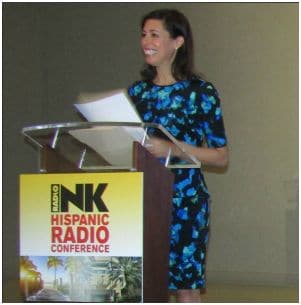
On Wednesday, at the Radio Ink Hispanic Radio Conference in Miami, during her keynote address, FCC Commissioner Jessica Rosenworcel spoke about her trip to Puerto Rico last week. Puerto Rico was hit hard by Hurricane Maria six months ago and is still recovering. Rosenworcel said she took some time to visit several radio stations. And she walked away saying this: “Radio is remarkable.”
Rosenworcel said radio is remarkable despite the fact we now live in a world with so many platforms, so many ways to listen, so many ways to consume information and entertainment. “But there is still something special about a voice in the air. There is still something extraordinary about how a single signal can reach out and connect with so many of us. I know. I saw it clearly in Puerto Rico — and I know that power resides in the work you do every day.”
Rosenworcel went on to tell about her visits to WKAQ-AM and WAPA-AM, both in San Juan. Here’s exactly what she said about both visits…
“Let me start with WKAQ. Its studios are in Guaynabo in a modern building with cool marble everywhere — and lots of windows. In fact, the top of the building is a big expanse of circular glass. So when Hurricane Maria first started to roar, WKAQ hunkered down. They were determined to ride out the storm and offer the news and information they knew their listeners needed. But when the winds really arrived, the glass top of the building shattered. The rain came down and turned the stairs into a virtual waterfall. The office seemed to explode. Ruben Sanchez was on the air doing a live interview with Governor Ricardo Rossello when this happened. He interrupted the back-and-forth with the island’s highest-level official to announce that the studio was now vulnerable but he assured his listeners they would do what they could to stay on-air.
“To do so, they hatched a plan to relocate to the transmitter nearby. But when they arrived at the squat cement building where their facilities sat, it was surrounded by water. The creek nearby had risen several feet and had flooded the area. The building stood a virtual island in the middle of a toxic pool of water. That didn’t stop WKAQ. They secured a truck with monster tires and drove right in. Then they set up a studio in a small room with an old linoleum floor and a cooling system — a rickety fan. They dove back in, doing what radio does best — providing essential content for the community they serve. From this crude studio they broadcast out conversations with the Governor, mayors, and other officials with news to spread about the storm.
“But they didn’t stop there. You see, you didn’t need to be an official in a leadership role to get the makeshift studio’s time and attention. Because when word got out they were still broadcasting, they fielded calls from Florida, New York, Illinois, and Texas and used their signal to assist those on the mainland with locating their loved ones in Puerto Rico after the storm.
“WAPA was the only broadcaster to remain on the air throughout Hurricane Maria. They are a small family-owned operation, but they did big things to keep the island informed throughout the storm. In fact, they did more than keep their listeners informed. They saved lives. When the rains started, the employees moved in to the station to weather the storm determined to use their broadcasting capability to help in any way they could. With their generators going, public officials dropped by and used the station signal to reach out to their constituents. With their phones not working, residents queued up at the station, seeking information about the safety of their friends, neighbors, and coworkers. And WAPA took it all in — and read it on-air. In fact, the station still has the cardboard boxes where they kept the notes written on stray scraps of paper from anyone and everyone who stopped by the station seeking help and assistance.
“The stories from those visits are unbelievable. A cardiac surgeon visited the station seeking the mother of a newborn in urgent need of heart surgery in order to authorize placing the infant on a flight for medical evacuees. As a result of his on-air plea, relief workers were able to track her down. The station also got the word out to help a home for the elderly that had run out of diesel for its generator. Listeners responded with fuel, food, and water. A kidney patient got a ride to a dialysis center, medicine was delivered to those in need, and calls were taken that helped first responders rescue those trapped on the rooves of their homes, threatened by rough and rising water.
“One of the most striking things about this station’s story, however, was not just that they opened their doors to the community, but that they opened their door to competitors. They invited in journalists and on-air personalities from other stations to broadcast and help get the word out over WAPA’s airwaves. As every broadcaster I visited with on the island told me, they were no longer competing for listeners, they were a team with one goal — staying on the air — and serving the community. I don’t think you’ll find a better demonstration of radio’s commitment to the public interest than that.”





